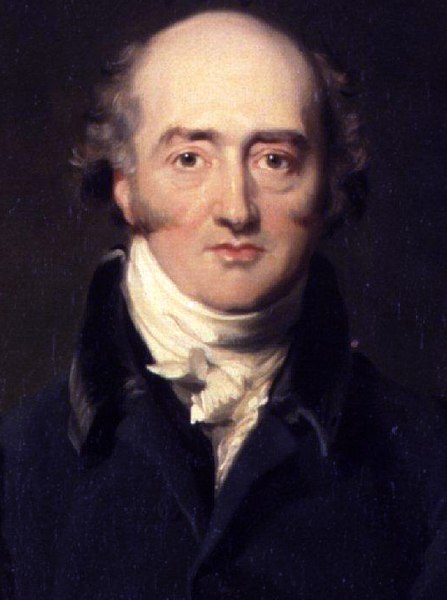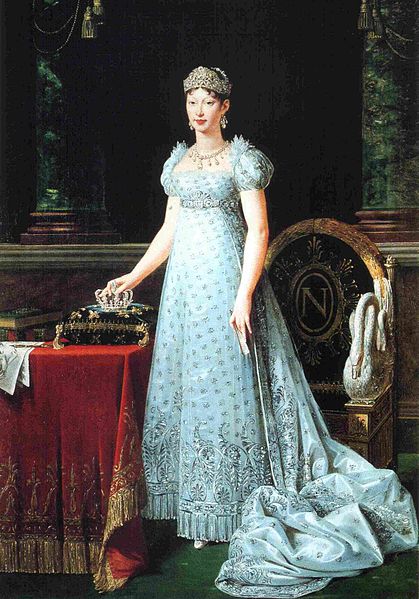 |
| Countess Dorothea Lieven |
Complications
Dorothea’s correspondence with Metternich provided him with
a much needed insight into Russian and English political life. For the English
1820 was the year of the royal divorce; George III died in January and the
Prince Regent finally became king. George IV was determined to get rid of his
hated wife and Princess Caroline was determined to be acknowledged queen. The
couple had lived separately since 1796 and Caroline had left England in 1814.
George’s plans for a divorce were scuppered when his
advisers informed him that not only Caroline’s affairs but his own would become
a matter of public knowledge.
‘The
whole business has become such a party question, that there are no ties of
family and friendship that still hold good.’[i]
 |
| George IV |
Support for the divorce bill going through parliament
slipped away, while the king worried about his upcoming coronation, Caroline
had intimated her intention to attend.
Despite spending over a quarter of a million pounds[ii] on the ceremony and
accompanying festivities, the attention was all outside the abbey where Caroline
was refused admittance[iii], much to the delight of
the spectators. During the five hour ceremony George was unable to keep his
eyes off his latest mistress Lady
Conyngham. According to spectators the king was;
‘Nodding
and winking......and sighing and making eyes’[iv]
at his lover. Dorothea kept Metternich fully informed of the
convolutions caused by the divorce attempt. The Duke of York attempted to play
on his brother’s unpopularity with the masses and the result of his antics was
a further lessening of the unflattering view held of the monarchy. George IV
was not viewed with the love and respect that the British had given George III
in his old age.
A Trip to Europe
 |
| Princess of Orange |
Christopher was called back to St Petersburg to discuss
Greece where the Czar’s co-religionists had rebelled
against their Muslim masters, the Ottoman Turks. Dorothea travelled to Brussels
with the 18 month old George. The Lievens travelled together to Rochester where
Christopher left his wife and son.
‘I
am quite miserable at our separation, I imagine storms and every possible
contrary wind…..Baby is delicious, every time he sees me crying he comes and
kisses me and says, “Papa, gone, gone.”’[v]
Dorothea travelled on to Dover and she and George crossed
the channel in 2½ hours. In Brussels Dorothea was the guest of the Princess of Orange[vi]. From Brussels Dorothea
travelled to Spa which she found very boring despite the attentions of Prince
Louis de Rohan who’d travelled thence from Paris just to be with Dorothea. Dorothea’s
main interest was in her post from England which she would forward to
Christopher and sent tit-bits to Metternich. Wellington wrote to her detailing
the trials and tribulations over the divorce and coronation.
 |
| Schloss Johannisberg |
By July Dorothea was in Schlagenbad, a small watering place
near Weisbaden. Schlagenbad was conveniently near Metternich’s country castle at Johannisberg.
Dorothea had hoped to meet Metternich but he was too busy trying to sort out
the Greek problem to take leave of absence. Dorothea visited in his absence and
gloried in the view.
From Schlagenbad Dorothea moved to Frankfurt and it was
here, in September, that a summons from George IV reached her. Her presence was
required in Hanover
where Christopher was expected en route from
St Petersburg. Christopher did not arrive until the eve of George’s departure
and Dorothea was able to spend her time in Hanover with Metternich who was also
meeting with George.
Political Problems
 |
| Lady Castlereagh (National Portrait Gallery) |
British politicians were becoming aware that to pass
information on to Metternich they only needed to inform Dorothea. In turn Dorothea
made use of the affection Lord Castlereagh had for her, to forward her letters
to Metternich. Castlereagh liked talking to Dorothea and he insisted on
waltzing with her. Castlereagh used to ride along Dorothea’s favourite walks in
the hopes of meeting up with her.
Dorothea offered to act as an intermediary between Lady
Conyngham who had conceived a violent dislike for Lady Castlereagh[vii], niece of George’s
former lover Lady
Hertford. Lady Conyngham refused to attend a banquet in honour of the Crown Prince of
Denmark as Lady Castlereagh was also invited.
Despite despising the favourite for her grasping behaviour,
Dorothea managed to persuade Lady Conyngham, much disliked by the court, that
the Foreign Secretary and his wife were obliged to attend the banquet. Her work
was made more difficult by Lady Castlereagh’s refusal to bend with the wind and
curry favour with the favourite.
Castlereagh flew into a rage when Dorothea informed him of
Lady Conyngham’s presumption;
‘Things
cannot go on like this. We cannot put up with a Lady Conyngham who is powerful
enough to offer us such affronts.’[viii]
He threatened to resign if matters deteriorated, despite
Dorothea reminding him that such as Lady Conyngham had to be put up with.
Castlereagh’s wild appearance and confused talk worried Dorothea. He was
infuriated and humiliated that his wife’s presence at the banquet was solely
due to the intervention of a foreign ambassadress.
Death of a Foreign
Secretary
 |
| Lord Castlereagh |
Castlereagh’s half-brother, Sir
Charles Stewart, claimed that Castlereagh was suffering from overwork.
Castlereagh felt he was not being supported by his colleagues and that the
weight of government was borne on his shoulders. Castlereagh was a broken man
fearing that his colleagues were conspiring to replace him with Wellington.
On 9th Castlereagh had an audience with the king
and then met with several ambassadors including Christopher. He acted oddly
during the meeting but Christopher was inured to the Foreign Secretary’s
eccentricities and took no notice.
On 12th August Castlereagh committed suicide; he
cut the artery in his neck with a penknife while his wife was in her dressing
room. Dorothea was shocked by the loss of someone she counted as a friend. She
wrote to Metternich;
‘I
cannot get over it. I see him in front of me all the time; that noble face, so
serene and handsome.’[ix]
 |
| George Canning |
Castlereagh’s successor George Canning was no
friend to Russia. His detractors were legion; the king disliked him[x], the Opposition hated him
and even his own side distrusted him. Canning had ambition writ large upon him[xi]. Canning described the
letter from the king offering the Foreign Office post as;
‘Exactly
the same as being given a ticket for Almack’s and finding written on the back:
“Admit the Rogue.”’[xii]
Dorothea had hoped the Foreign Secretary post would go to
Wellington, who she counted as a personal friend. Indeed when Dorothea played
waltzes on the pianoforte the unmusical Wellington had been known to accompany
her on the triangle. Wellington also sufficiently unbent to act in
country-house charades with Dorothea. He’d assured Dorothea that Britain’s
policy towards Russia would not change as change would result in plunging
Europe into chaos.
Congress of Verona
 |
| Marie Louise (1812) |
In October 1820 the Lievens, Wellington[xiii] and the Metternichs all
converged at the Congress
of Verona, where Marie Louise
Duchess of Palma[xiv] was among those who
haunted Dorothea’s salon. Card tables and the hostess were the main attraction
in the evenings. Mornings were reserved for Metternich, Nesselrode and
Wellington.
‘The
Princess de Lieven is my only refuge in society here. I pass every evening at
her house, and most of the congress members follow my example’[xv]
Metternich wrote to his wife. The Czar and the Emperor of
Austria also attended the congress.
The doyen of the Paris salons during the First Republic, Juliette Récamier
was in Verona, as the mistress of the French representative the Vicomte
de Chateaubriand.
Chateaubriand was recently returned from America and full
of stories of the animals he had seen there. He and Dorothea disliked one
another. Dorothea characterised Chateaubriand as a bore while he, in turn,
called her the ‘dowager’ of Verona
and wrote spitefully of her in his memoirs[xvi].
 |
| Juliette Recamier |
The congress had been convoked to deal with problems in
Spain, Italy and the Ottoman
Empire. Alexander and the French were ready to march into Spain where the
king had called for help against the liberals, a project viewed with distate by
Canning. On 30th October Wellington had to inform Metternich that
Britain was not prepared to intervene in foreign affairs. Wellington was
convinced that;
‘There
is nothing so improper as for one government to interfere in the internal
affairs of another.’[xvii]
He left the congress the day before it wound up and was back
in London by Christmas.
Dorothea suffered a setback in her personal affairs; while
in Verona she took advantage of her access to Nesselrode to press for the
Lievens transfer to Vienna so she could be close to Metternich. Dorothea also
urged her brother Alexander to ask the Czar to favour the move. But Nesselrode
and Czar Alexander were worried about Dorothea’s trustworthiness and the move did
not take place.
Bibliography
The Princess and the Politicians – John Charmley, Penguin
Books 2006
Captain Gronow – Christopher Hibbert (ed), Kyle Cathie Ltd
1991
Wellington – Christopher Hibbert, Harper Collins 1997
Paris Between Empires – Philip Mansel, Phoenix Press
Paperback 2003
The Life and Times of George IV – Alan Palmer, Book Club
Associates 1972
The Russian Empire – Hugh Seton-Watson, Oxford University
Press 1988
Metternich – Desmond Seward, Viking 1991
Arch Intriguer – Priscilla Zamoyska, Heinemann Ltd 1957
www.wikipedia.en
[i]
Arch Intriguer - Zamoyska
[ii]
In 2014
the relative: historic standard of living value of that income or wealth is £17,850,000.00 economic status value of that income or wealth is £332,200,000.00 economic power value of that income or wealth is £1,009,000,000.00 www.measuringworth.com
[iii]
She had not been given a ticket; George was frightened that Caroline would
create a scene on his big day and demand to be crowned with him
[iv]
George IV - Palmer
[v]
Arch Intriguer - Zamoyska
[vi]
Sister of the Czar
[vii]
The feeling was mutual
[viii]
The Princess and the Politicians - Charmley
[ix]
Arch Intriguer - Zamoyska
[x]
Canning had been Caroline’s ‘intimate
adviser’
[xi]
Ambition was distrusted by the landed politicians and Canning’s ambition was
attributed by those who wished him ill to the fact that his mother had been an
actress for a while
[xii]
The Princess and the Politicians - Charmley
[xiii]
In place of Castlereagh
[xiv]
Napoleon’s widow
[xv]
Arch Intriguer - Zamoyska
[xvii]
Wellington - Hibbert
Adorable: Imagining the Countess playing waltzes on the pianoforte and the unmusical Wellington accompanying her on the triangle. :- )))
ReplyDeleteThank you so much for sharing!